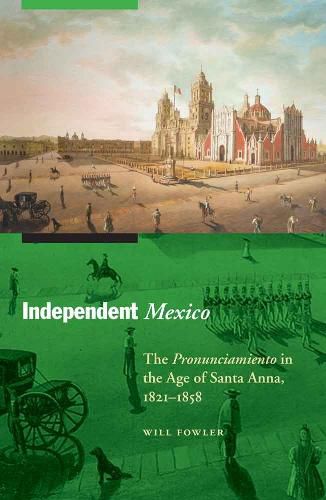Readings Newsletter
Become a Readings Member to make your shopping experience even easier.
Sign in or sign up for free!
You’re not far away from qualifying for FREE standard shipping within Australia
You’ve qualified for FREE standard shipping within Australia
The cart is loading…






In mid-nineteenth-century Mexico, garrisons, town councils, state legislatures, and an array of political actors, groups, and communities began aggressively petitioning the government at both local and national levels to address their grievances. Often viewed as a revolt or a coup d'etat, these pronunciamientos were actually a complex form of insurrectionary action that relied first on the proclamation and circulation of a plan that listed the petitioners’ demands and then on endorsement by copycat pronunciamientos that forced the authorities, be they national or regional, to the negotiating table. In Independent Mexico, Will Fowler provides a comprehensive overview of the pronunciamiento practice following the Plan of Iguala. This fourth and final installment in, and culmination of, a larger exploration of the pronunciamiento highlights the extent to which this model of political contestation evolved. The result of more than three decades of pronunciamiento politics was the bloody Civil War of the Reforma (1858-60) and the ensuing French Intervention (1862-67). Given the frequency and importance of the pronunciamiento, this book is also a concise political history of independent Mexico.
$9.00 standard shipping within Australia
FREE standard shipping within Australia for orders over $100.00
Express & International shipping calculated at checkout
In mid-nineteenth-century Mexico, garrisons, town councils, state legislatures, and an array of political actors, groups, and communities began aggressively petitioning the government at both local and national levels to address their grievances. Often viewed as a revolt or a coup d'etat, these pronunciamientos were actually a complex form of insurrectionary action that relied first on the proclamation and circulation of a plan that listed the petitioners’ demands and then on endorsement by copycat pronunciamientos that forced the authorities, be they national or regional, to the negotiating table. In Independent Mexico, Will Fowler provides a comprehensive overview of the pronunciamiento practice following the Plan of Iguala. This fourth and final installment in, and culmination of, a larger exploration of the pronunciamiento highlights the extent to which this model of political contestation evolved. The result of more than three decades of pronunciamiento politics was the bloody Civil War of the Reforma (1858-60) and the ensuing French Intervention (1862-67). Given the frequency and importance of the pronunciamiento, this book is also a concise political history of independent Mexico.